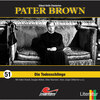Kitabı oku: «Tremendous Trifles», sayfa 8
XXII. The Orthodox Barber
Those thinkers who cannot believe in any gods often assert that the love of humanity would be in itself sufficient for them; and so, perhaps, it would, if they had it. There is a very real thing which may be called the love of humanity; in our time it exists almost entirely among what are called uneducated people; and it does not exist at all among the people who talk about it.
A positive pleasure in being in the presence of any other human being is chiefly remarkable, for instance, in the masses on Bank Holiday; that is why they are so much nearer Heaven (despite appearances) than any other part of our population.
I remember seeing a crowd of factory girls getting into an empty train at a wayside country station. There were about twenty of them; they all got into one carriage; and they left all the rest of the train entirely empty. That is the real love of humanity. That is the definite pleasure in the immediate proximity of one’s own kind. Only this coarse, rank, real love of men seems to be entirely lacking in those who propose the love of humanity as a substitute for all other love; honourable, rationalistic idealists.
I can well remember the explosion of human joy which marked the sudden starting of that train; all the factory girls who could not find seats (and they must have been the majority) relieving their feelings by jumping up and down. Now I have never seen any rationalistic idealists do this. I have never seen twenty modern philosophers crowd into one third-class carriage for the mere pleasure of being together. I have never seen twenty Mr. McCabes all in one carriage and all jumping up and down.
Some people express a fear that vulgar trippers will overrun all beautiful places, such as Hampstead or Burnham Beeches. But their fear is unreasonable; because trippers always prefer to trip together; they pack as close as they can; they have a suffocating passion of philanthropy.
…
But among the minor and milder aspects of the same principle, I have no hesitation in placing the problem of the colloquial barber. Before any modern man talks with authority about loving men, I insist (I insist with violence) that he shall always be very much pleased when his barber tries to talk to him. His barber is humanity: let him love that. If he is not pleased at this, I will not accept any substitute in the way of interest in the Congo or the future of Japan. If a man cannot love his barber whom he has seen, how shall he love the Japanese whom he has not seen?
It is urged against the barber that he begins by talking about the weather; so do all dukes and diplomatists, only that they talk about it with ostentatious fatigue and indifference, whereas the barber talks about it with an astonishing, nay incredible, freshness of interest. It is objected to him that he tells people that they are going bald. That is to say, his very virtues are cast up against him; he is blamed because, being a specialist, he is a sincere specialist, and because, being a tradesman, he is not entirely a slave. But the only proof of such things is by example; therefore I will prove the excellence of the conversation of barbers by a specific case. Lest any one should accuse me of attempting to prove it by fictitious means, I beg to say quite seriously that though I forget the exact language employed, the following conversation between me and a human (I trust), living barber really took place a few days ago.
…
I had been invited to some At Home to meet the Colonial Premiers, and lest I should be mistaken for some partly reformed bush-ranger out of the interior of Australia I went into a shop in the Strand to get shaved. While I was undergoing the torture the man said to me:
“There seems to be a lot in the papers about this new shaving, sir. It seems you can shave yourself with anything – with a stick or a stone or a pole or a poker” (here I began for the first time to detect a sarcastic intonation) “or a shovel or a – ”
Here he hesitated for a word, and I, although I knew nothing about the matter, helped him out with suggestions in the same rhetorical vein.
“Or a button-hook,” I said, “or a blunderbuss or a battering-ram or a piston-rod – ”
He resumed, refreshed with this assistance, “Or a curtain rod or a candle-stick, or a – ”
“Cow-catcher,” I suggested eagerly, and we continued in this ecstatic duet for some time. Then I asked him what it was all about, and he told me. He explained the thing eloquently and at length.
“The funny part of it is,” he said, “that the thing isn’t new at all. It’s been talked about ever since I was a boy, and long before. There is always a notion that the razor might be done without somehow. But none of those schemes ever came to anything; and I don’t believe myself that this will.”
“Why, as to that,” I said, rising slowly from the chair and trying to put on my coat inside out, “I don’t know how it may be in the case of you and your new shaving. Shaving, with all respect to you, is a trivial and materialistic thing, and in such things startling inventions are sometimes made. But what you say reminds me in some dark and dreamy fashion of something else. I recall it especially when you tell me, with such evident experience and sincerity, that the new shaving is not really new. My friend, the human race is always trying this dodge of making everything entirely easy; but the difficulty which it shifts off one thing it shifts on to another. If one man has not the toil of preparing a man’s chin, I suppose that some other man has the toil of preparing something very curious to put on a man’s chin. It would be nice if we could be shaved without troubling anybody. It would be nicer still if we could go unshaved without annoying anybody —
“‘But, O wise friend, chief Barber of the Strand,
Brother, nor you nor I have made the world.’
“Whoever made it, who is wiser, and we hope better than we, made it under strange limitations, and with painful conditions of pleasure.
“In the first and darkest of its books it is fiercely written that a man shall not eat his cake and have it; and though all men talked until the stars were old it would still be true that a man who has lost his razor could not shave with it. But every now and then men jump up with the new something or other and say that everything can be had without sacrifice, that bad is good if you are only enlightened, and that there is no real difference between being shaved and not being shaved. The difference, they say, is only a difference of degree; everything is evolutionary and relative. Shavedness is immanent in man. Every ten-penny nail is a Potential Razor. The superstitious people of the past (they say) believed that a lot of black bristles standing out at right angles to one’s face was a positive affair. But the higher criticism teaches us better. Bristles are merely negative. They are a Shadow where Shaving should be.
“Well, it all goes on, and I suppose it all means something. But a baby is the Kingdom of God, and if you try to kiss a baby he will know whether you are shaved or not. Perhaps I am mixing up being shaved and being saved; my democratic sympathies have always led me to drop my ‘h’s.’ In another moment I may suggest that goats represent the lost because goats have long beards. This is growing altogether too allegorical.
“Nevertheless,” I added, as I paid the bill, “I have really been profoundly interested in what you told me about the New Shaving. Have you ever heard of a thing called the New theology?”
He smiled and said that he had not.
XXIII. The Toy Theatre
There is only one reason why all grown-up people do not play with toys; and it is a fair reason. The reason is that playing with toys takes so very much more time and trouble than anything else. Playing as children mean playing is the most serious thing in the world; and as soon as we have small duties or small sorrows we have to abandon to some extent so enormous and ambitious a plan of life. We have enough strength for politics and commerce and art and philosophy; we have not enough strength for play. This is a truth which every one will recognize who, as a child, has ever played with anything at all; any one who has played with bricks, any one who has played with dolls, any one who has played with tin soldiers. My journalistic work, which earns money, is not pursued with such awful persistency as that work which earned nothing.
…
Take the case of bricks. If you publish a book to-morrow in twelve volumes (it would be just like you) on “The Theory and Practice of European Architecture,” your work may be laborious, but it is fundamentally frivolous. It is not serious as the work of a child piling one brick on the other is serious; for the simple reason that if your book is a bad book no one will ever be able ultimately and entirely to prove to you that it is a bad book. Whereas if his balance of bricks is a bad balance of bricks, it will simply tumble down. And if I know anything of children, he will set to work solemnly and sadly to build it up again. Whereas, if I know anything of authors, nothing would induce you to write your book again, or even to think of it again if you could help it.
Take the case of dolls. It is much easier to care for an educational cause than to care for a doll. It is as easy to write an article on education as to write an article on toffee or tramcars or anything else. But it is almost as difficult to look after a doll as to look after a child. The little girls that I meet in the little streets of Battersea worship their dolls in a way that reminds one not so much of play as idolatry. In some cases the love and care of the artistic symbol has actually become more important than the human reality which it was, I suppose, originally meant to symbolize.
I remember a Battersea little girl who wheeled her large baby sister stuffed into a doll’s perambulator. When questioned on this course of conduct, she replied: “I haven’t got a dolly, and Baby is pretending to be my dolly.” Nature was indeed imitating art. First a doll had been a substitute for a child; afterwards a child was a mere substitute for a doll. But that opens other matters; the point is here that such devotion takes up most of the brain and most of the life; much as if it were really the thing which it is supposed to symbolize. The point is that the man writing on motherhood is merely an educationalist; the child playing with a doll is a mother.
Take the case of soldiers. A man writing an article on military strategy is simply a man writing an article; a horrid sight. But a boy making a campaign with tin soldiers is like a General making a campaign with live soldiers. He must to the limit of his juvenile powers think about the thing; whereas the war correspondent need not think at all. I remember a war correspondent who remarked after the capture of Methuen: “This renewed activity on the part of Delarey is probably due to his being short of stores.” The same military critic had mentioned a few paragraphs before that Delarey was being hard pressed by a column which was pursuing him under the command of Methuen. Methuen chased Delarey; and Delarey’s activity was due to his being short of stores. Otherwise he would have stood quite still while he was chased. I run after Jones with a hatchet, and if he turns round and tries to get rid of me the only possible explanation is that he has a very small balance at his bankers. I cannot believe that any boy playing at soldiers would be as idiotic as this. But then any one playing at anything has to be serious. Whereas, as I have only too good reason to know, if you are writing an article you can say anything that comes into your head.
…
Broadly, then, what keeps adults from joining in children’s games is, generally speaking, not that they have no pleasure in them; it is simply that they have no leisure for them. It is that they cannot afford the expenditure of toil and time and consideration for so grand and grave a scheme. I have been myself attempting for some time past to complete a play in a small toy theatre, the sort of toy theatre that used to be called Penny Plain and Twopence Coloured; only that I drew and coloured the figures and scenes myself. Hence I was free from the degrading obligation of having to pay either a penny or twopence; I only had to pay a shilling a sheet for good cardboard and a shilling a box for bad water colours. The kind of miniature stage I mean is probably familiar to every one; it is never more than a development of the stage which Skelt made and Stevenson celebrated.
But though I have worked much harder at the toy theatre than I ever worked at any tale or article, I cannot finish it; the work seems too heavy for me. I have to break off and betake myself to lighter employments; such as the biographies of great men. The play of “St. George and the Dragon,” over which I have burnt the midnight oil (you must colour the thing by lamplight because that is how it will be seen), still lacks most conspicuously, alas! two wings of the Sultan’s Palace, and also some comprehensible and workable way of getting up the curtain.
All this gives me a feeling touching the real meaning of immortality. In this world we cannot have pure pleasure. This is partly because pure pleasure would be dangerous to us and to our neighbours. But it is partly because pure pleasure is a great deal too much trouble. If I am ever in any other and better world, I hope that I shall have enough time to play with nothing but toy theatres; and I hope that I shall have enough divine and superhuman energy to act at least one play in them without a hitch.
…
Meanwhile the philosophy of toy theatres is worth any one’s consideration. All the essential morals which modern men need to learn could be deduced from this toy. Artistically considered, it reminds us of the main principle of art, the principle which is in most danger of being forgotten in our time. I mean the fact that art consists of limitation; the fact that art is limitation. Art does not consist in expanding things. Art consists of cutting things down, as I cut down with a pair of scissors my very ugly figures of St. George and the Dragon. Plato, who liked definite ideas, would like my cardboard dragon; for though the creature has few other artistic merits he is at least dragonish. The modern philosopher, who likes infinity, is quite welcome to a sheet of the plain cardboard. The most artistic thing about the theatrical art is the fact that the spectator looks at the whole thing through a window. This is true even of theatres inferior to my own; even at the Court Theatre or His Majesty’s you are looking through a window; an unusually large window. But the advantage of the small theatre exactly is that you are looking through a small window. Has not every one noticed how sweet and startling any landscape looks when seen through an arch? This strong, square shape, this shutting off of everything else is not only an assistance to beauty; it is the essential of beauty. The most beautiful part of every picture is the frame.
This especially is true of the toy theatre; that, by reducing the scale of events it can introduce much larger events. Because it is small it could easily represent the earthquake in Jamaica. Because it is small it could easily represent the Day of Judgment. Exactly in so far as it is limited, so far it could play easily with falling cities or with falling stars. Meanwhile the big theatres are obliged to be economical because they are big. When we have understood this fact we shall have understood something of the reason why the world has always been first inspired by small nationalities. The vast Greek philosophy could fit easier into the small city of Athens than into the immense Empire of Persia. In the narrow streets of Florence Dante felt that there was room for Purgatory and Heaven and Hell. He would have been stifled by the British Empire. Great empires are necessarily prosaic; for it is beyond human power to act a great poem upon so great a scale. You can only represent very big ideas in very small spaces. My toy theatre is as philosophical as the drama of Athens.
XXIV. A Tragedy of Twopence
My relations with the readers of this page have been long and pleasant, but – perhaps for that very reason – I feel that the time has come when I ought to confess the one great crime of my life. It happened a long time ago; but it is not uncommon for a belated burst of remorse to reveal such dark episodes long after they have occurred. It has nothing to do with the orgies of the Anti-Puritan League. That body is so offensively respectable that a newspaper, in describing it the other day, referred to my friend Mr. Edgar Jepson as Canon Edgar Jepson; and it is believed that similar titles are intended for all of us. No; it is not by the conduct of Archbishop Crane, of Dean Chesterton, of the Rev. James Douglas, of Monsignor Bland, and even of that fine and virile old ecclesiastic, Cardinal Nesbit, that I wish (or rather, am driven by my conscience) to make this declaration. The crime was committed in solitude and without accomplices. Alone I did it. Let me, with the characteristic thirst of penitents to get the worst of the confession over, state it first of all in its most dreadful and indefensible form. There is at the present moment in a town in Germany (unless he has died of rage on discovering his wrong), a restaurant-keeper to whom I still owe twopence. I last left his open-air restaurant knowing that I owed him twopence. I carried it away under his nose, despite the fact that the nose was a decidedly Jewish one. I have never paid him, and it is highly improbable that I ever shall. How did this villainy come to occur in a life which has been, generally speaking, deficient in the dexterity necessary for fraud? The story is as follows – and it has a moral, though there may not be room for that.
…
It is a fair general rule for those travelling on the Continent that the easiest way of talking in a foreign language is to talk philosophy. The most difficult kind of talking is to talk about common necessities. The reason is obvious. The names of common necessities vary completely with each nation and are generally somewhat odd and quaint. How, for instance, could a Frenchman suppose that a coalbox would be called a “scuttle”? If he has ever seen the word scuttle it has been in the Jingo Press, where the “policy of scuttle” is used whenever we give up something to a small Power like Liberals, instead of giving up everything to a great Power, like Imperialists. What Englishman in Germany would be poet enough to guess that the Germans call a glove a “hand-shoe.” Nations name their necessities by nicknames, so to speak. They call their tubs and stools by quaint, elvish, and almost affectionate names, as if they were their own children! But any one can argue about abstract things in a foreign language who has ever got as far as Exercise IV. in a primer. For as soon as he can put a sentence together at all he finds that the words used in abstract or philosophical discussions are almost the same in all nations. They are the same, for the simple reason that they all come from the things that were the roots of our common civilisation. From Christianity, from the Roman Empire, from the mediaeval Church, or the French Revolution. “Nation,” “citizen,” “religion,” “philosophy,” “authority,” “the Republic,” words like these are nearly the same in all the countries in which we travel. Restrain, therefore, your exuberant admiration for the young man who can argue with six French atheists when he first lands at Dieppe. Even I can do that. But very likely the same young man does not know the French for a shoe-horn. But to this generalisation there are three great exceptions. (1) In the case of countries that are not European at all, and have never had our civic conceptions, or the old Latin scholarship. I do not pretend that the Patagonian phrase for “citizenship” at once leaps to the mind, or that a Dyak’s word for “the Republic” has been familiar to me from the nursery. (2) In the case of Germany, where, although the principle does apply to many words such as “nation” and “philosophy,” it does not apply so generally, because Germany has had a special and deliberate policy of encouraging the purely German part of its language. (3) In the case where one does not know any of the language at all, as is generally the case with me.
…
Such at least was my situation on the dark day on which I committed my crime. Two of the exceptional conditions which I have mentioned were combined. I was walking about a German town, and I knew no German. I knew, however, two or three of those great and solemn words which hold our European civilisation together – one of which is “cigar.” As it was a hot and dreamy day, I sat down at a table in a sort of beer-garden, and ordered a cigar and a pot of lager. I drank the lager, and paid for it. I smoked the cigar, forgot to pay for it, and walked away, gazing rapturously at the royal outline of the Taunus mountains. After about ten minutes, I suddenly remembered that I had not paid for the cigar. I went back to the place of refreshment, and put down the money. But the proprietor also had forgotten the cigar, and he merely said guttural things in a tone of query, asking me, I suppose, what I wanted. I said “cigar,” and he gave me a cigar. I endeavoured while putting down the money to wave away the cigar with gestures of refusal. He thought that my rejection was of the nature of a condemnation of that particular cigar, and brought me another. I whirled my arms like a windmill, seeking to convey by the sweeping universality of my gesture that my rejection was a rejection of cigars in general, not of that particular article. He mistook this for the ordinary impatience of common men, and rushed forward, his hands filled with miscellaneous cigars, pressing them upon me. In desperation I tried other kinds of pantomime, but the more cigars I refused the more and more rare and precious cigars were brought out of the deeps and recesses of the establishment. I tried in vain to think of a way of conveying to him the fact that I had already had the cigar. I imitated the action of a citizen smoking, knocking off and throwing away a cigar. The watchful proprietor only thought I was rehearsing (as in an ecstasy of anticipation) the joys of the cigar he was going to give me. At last I retired baffled: he would not take the money and leave the cigars alone. So that this restaurant-keeper (in whose face a love of money shone like the sun at noonday) flatly and firmly refused to receive the twopence that I certainly owed him; and I took that twopence of his away with me and rioted on it for months. I hope that on the last day the angels will break the truth very gently to that unhappy man.
…
This is the true and exact account of the Great Cigar Fraud, and the moral of it is this – that civilisation is founded upon abstractions. The idea of debt is one which cannot be conveyed by physical motions at all, because it is an abstract idea. And civilisation obviously would be nothing without debt. So when hard-headed fellows who study scientific sociology (which does not exist) come and tell you that civilisation is material or indifferent to the abstract, just ask yourselves how many of the things that make up our Society, the Law, or the Stocks and Shares, or the National Debt, you would be able to convey with your face and your ten fingers by grinning and gesticulating to a German innkeeper.










